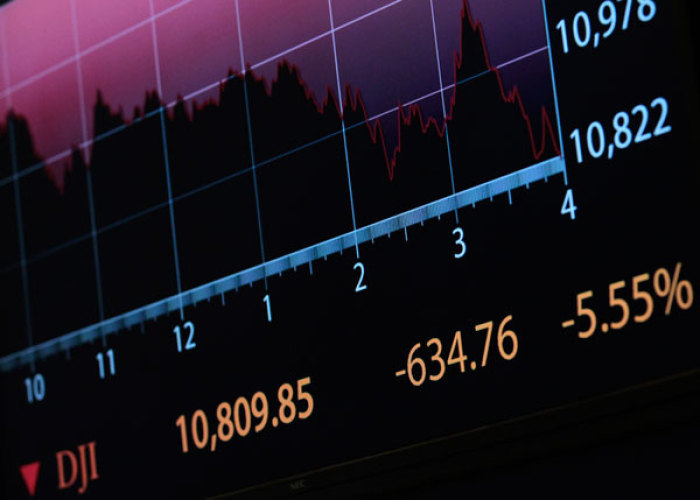If Christians care about the poor, they will care about the stock market crash

The Stock market, measured by the S&P 500, is down over 15% at the time of this writing, and is probably down more at the time of your reading. Should Christians care? They should. if they care about the poor.
A collapsing stock market, also called a bear market, remains one of the best predictors of a looming recession. Economists joke that bear markets have predicted 10 of the last eight recessions. Still, that’s a better record than economists have, who have predicted none of the recessions in the past century.
The top business cycle models include the stock and bond markets as leading indicators and the recent drop in both shouts that a recession is on the way. No one gets hurt more by a recession than the poor, who lose their jobs as unemployment rises and contributes to greater inequality.
Most Americans keep some savings in the stock market, if only in retirement accounts, pension funds, and life insurance. Those institutions used to invest in safe bonds, such as those issued by the U.S. government. But Federal Reserve monetary policy drove interest rates on bonds to near zero and forced those institutions to invest in the stock market to get the returns needed to pay retirees and policy holders. They have lost millions in the recent market decline.
The fall in the market results from the Federal Reserve’s promise to raise interest rates to kill inflation. Running at around 8% annually, inflation also hurts the poor: their dollars buy less food, gas, and other necessities. The Fed caused the high inflation that it is fighting through its irresponsible monetary policy since the last recession in 2008.
Fed economists believe that increasing the money supply will boost spending and jump start the economy after a recession. But for years after a recession, people hang onto the new money to rebuild savings lost from earlier market crashes and recessions in which they spent savings while unemployed. So, the Fed keeps printing new money until spending begins again.
The problem is that there are long and variable lags between Fed policy decisions and their impact on inflation and jobs. Rumors of changes in Fed policy impact the stock and bond markets almost immediately, which fools many economists into thinking everything else changes just as quickly. But studies show the lag between Fed policy changes and their impact on inflation to be one to two years. That means the inflation we suffer today is likely the result of policy decisions two years ago, and the increases in interest rates won’t have an effect for at least another year.
The Fed’s manipulation of the money supply violates the Bible’s commands prohibiting false weights and measures. Amos 8:4-6 is a good example:
Hear this, you who trample the needy, to do away with the humble of the land, saying,
“When will the new moon be over, so that we may sell grain, and the sabbath, that we may open the wheat market, to make the bushel smaller and the shekel bigger, and to cheat with dishonest scales, so as to buy the helpless for money and the needy for a pair of sandals, and that we may sell the refuse of the wheat?”
In the Hebrew Bible, merchants used scales to weigh silver when people paid for their goods. A shekel of silver weighed 180 barley grains. Evil merchants would use false, heavier weights to defraud customers and make them pay more than they should. The Fed does something similar today. The value of the U.S. dollar for most of our history was fixed at a certain weight of gold, which limited how much the Federal Reserve could manipulate its value. Eventually, politicians delinked the dollar from gold so the Fed could print as much as it wanted. The result is inflation, which the Fed counters through higher interest rates and recessions.
The dollar should be like a fixed weight that allows us to compare the values of other goods. An honest weight accurately reflects the demand for hamburgers, houses, and hotel rooms so that producers can coordinate their supply. When the Fed regularly changes the value of the dollar by printing more of them, it destroys that coordination and causes waste, inflation, and recessions.
Rising interest rates in the U.S. will benefit one group of people: the poor outside the U.S. who keep most of their savings in $100 dollar bills under their mattresses. Higher rates will cause the value of those dollars to rise against their local depreciating currencies and increase their savings.
Most Christians think of the stock market as a playground for the rich and greedy. But if they care about the poor as they claim, they will care about the stock market.
Roger D. McKinney lives in Broken Arrow, OK with his wife, Jeanie. He has three children and six grandchildren. He earned an M.A. in economics from the University of Oklahoma and B.A.s from the University of Tulsa and Baptist Bible College. He has written two books, Financial Bull Riding and God is a Capitalist: Markets from Moses to Marx, and articles for the Affluent Christian Investor, the Foundation for Economic Education, The Mises Institute, the American Institute for Economic Research and Townhall Finance. Previous articles can be found at facebook.com/thechristiancapitalist. He is a conservative Baptist and promoter of the Austrian school of economics.




























